4 min lettura
[Eng Below]
Anni fa ho letto Shantaram.
Anzi, ho adorato Shantaram. E ho adorato il protagonista: è proprio un tipo giusto con cui mi sono immedesimata tantissimo - che sia un eroinomane latitante australiano rifugiato tra la malavita di Bombay, è solo un dettaglio. E poi, perché mi piace perseverare, ho letto e adorato anche il seguito del libro: L’ombra della montagna. In totale parliamo di 2.202 pagine indiane. Mi hanno in qualche modo preparato al viaggio in India? Per niente. Così come non mi hanno preparato i video di YouTube e i consigli dei blog.
Dicono che all’India non si arrivi mai pronti. È vero. Ed è anche il motivo per cui ci tornerò prestissimo.
Comunque, oggi siamo in Ladakh che non è la vera India: lì ci arriverò tra qualche racconto. Il Ladakh è il piccolo Tibet e siamo immersi tra i massicci smisurati dell’Himalaya, i monasteri buddisti e le bandierine di stoffa colorate. E poi laghi, torrenti, deserti, valli, canyon: immagini che si addensano dentro il casco. C’è solo una cosa che si accumula nel casco più dei panorami spettacolari: la sabbia. Quintali di polvere nel naso, in bocca, negli occhi e la bandana che uso per proteggermi ce la mette proprio tutta, ma è una battaglia impari e la perde vergognosamente.
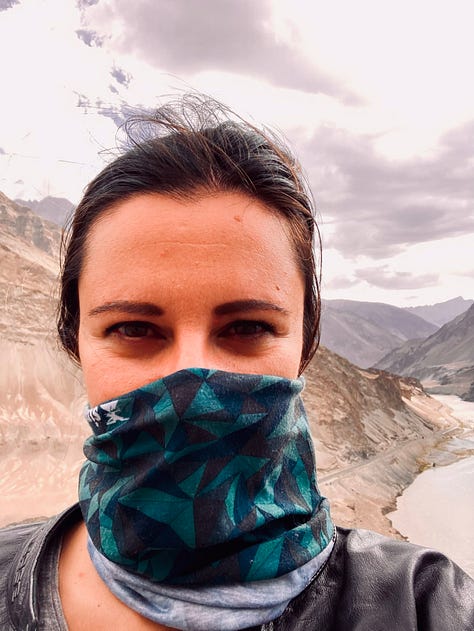
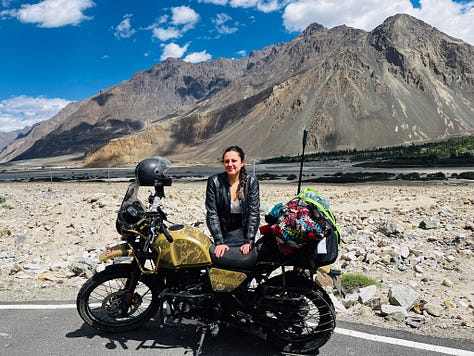
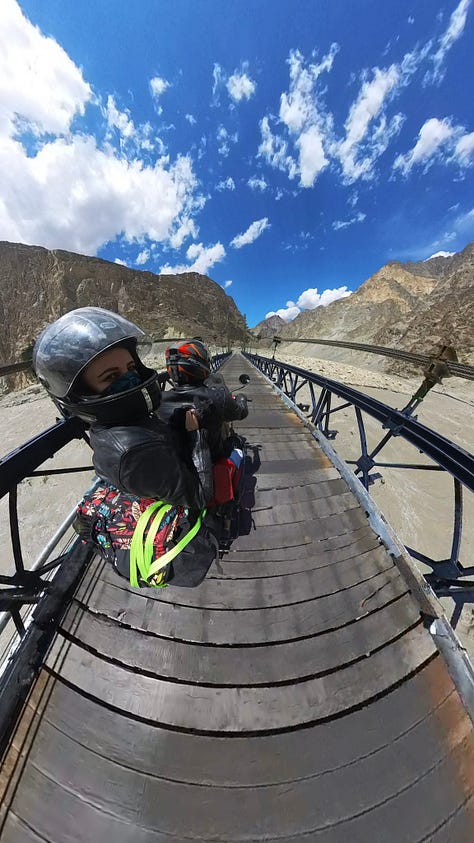
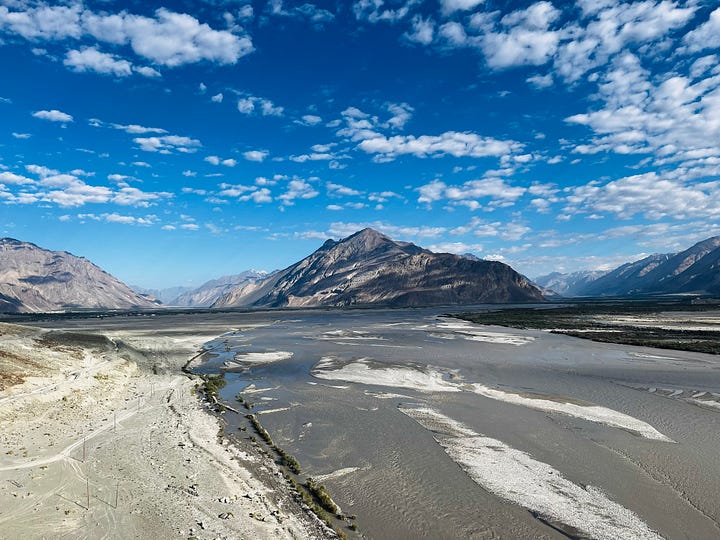
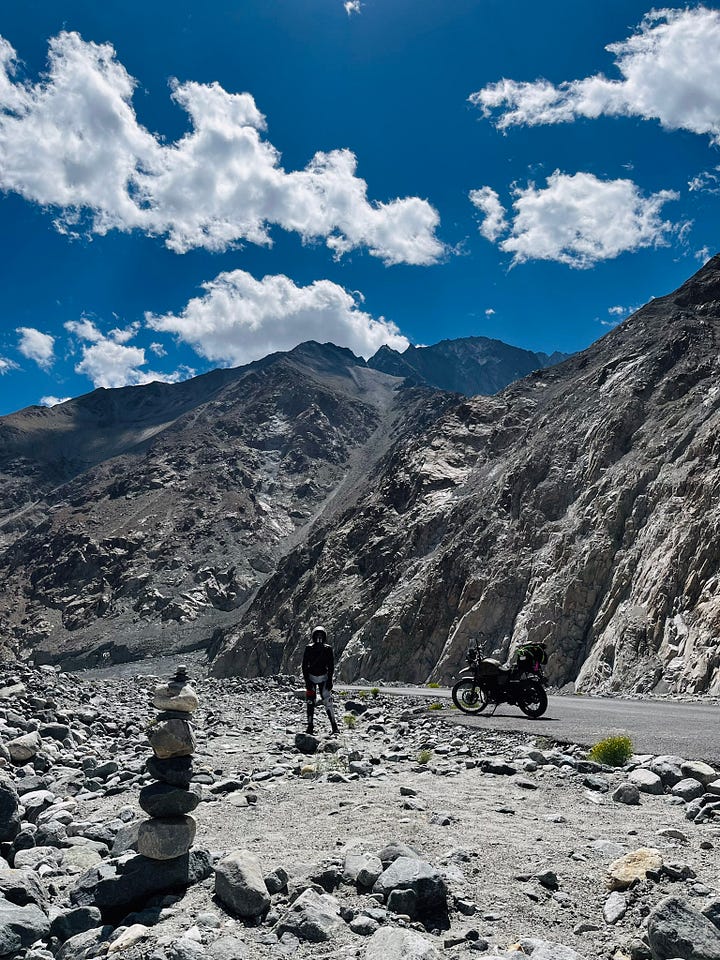
Ciao! Hai già letto la prima tappa in Ladakh? Eccola: Il mal di montagna del tricolore.
Qui invece puoi far un giro a Luxor, su Un Taxi chiamoto elicottero.
Shantaram mi ha invece preparato per l’incontro con gli abitanti del Ladakh: grazie al libro ho scoperto il dondolio degli angeli. Non lo avessi letto, forse me lo sarei lasciato sfuggire e sarebbe andato a sommarsi alle centinaia di cose che non ho afferrato davvero dell’India.
Dondolio degli angeli ce lo chiamo io.
In realtà è una tradizionale oscillazione della testa: si inclina di lato, come a voler toccare un orecchio verso una spalla e poi verso l’altra. Un ciondolamento ripetuto veloce - tre, quattro volte. Se provo a farlo io sembro colta da uno spasmo mortale. Quando te lo rivolgono loro, invece, ha una grazia e un fascino disarmanti.
Perché lo fanno sorridendo e lo fanno per mostrare rispetto, per dirti che sei accolto, che non ci sono pericoli o che sì, va bene quello che stai facendo. Lo fanno anche se dici una parola in Hindi e la pronunci così male che gli avrai tirato un insulto, ma loro si accontentano e dondolano la testa con una risata conciliante.
Al ragazzo che lavora nel campo dove dormiamo questa notte basta incrociargli per sbaglio lo sguardo che attacca a sorridere e oscillare. E io vorrei farlo sedere con me invece di farmi servire il caffè. Vorrei dirgli che deve smettere di scusarsi per l’inglese stentato: dondolando quegli occhi così buoni comunica già tutto il necessario.
Siamo arrivati sfiniti alla nostra tenda, dopo aver attraversato la farinosa valle di Nubra, fianco a fianco col fiume Shyok. E sul finire un miraggio al contrario: è apparso un deserto, con dune bianchissime e cammelli accoccolati. Incastonato tra picchi di monti bruni.
Stupore e stanchezza in battaglia.
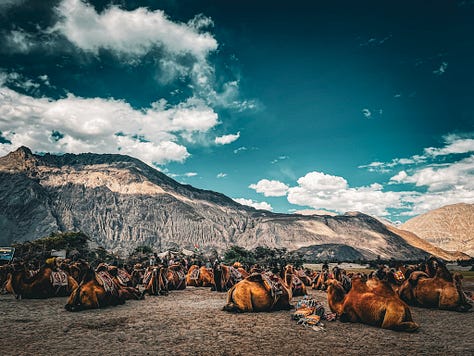
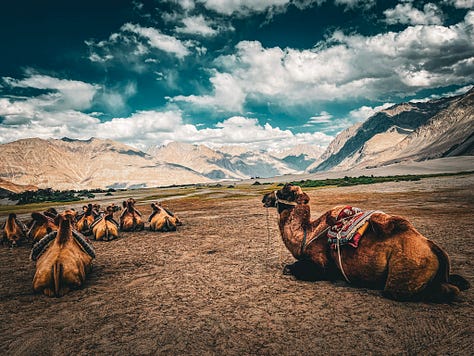
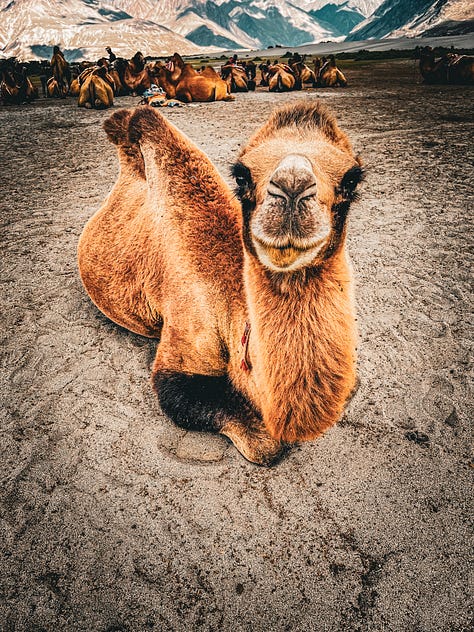

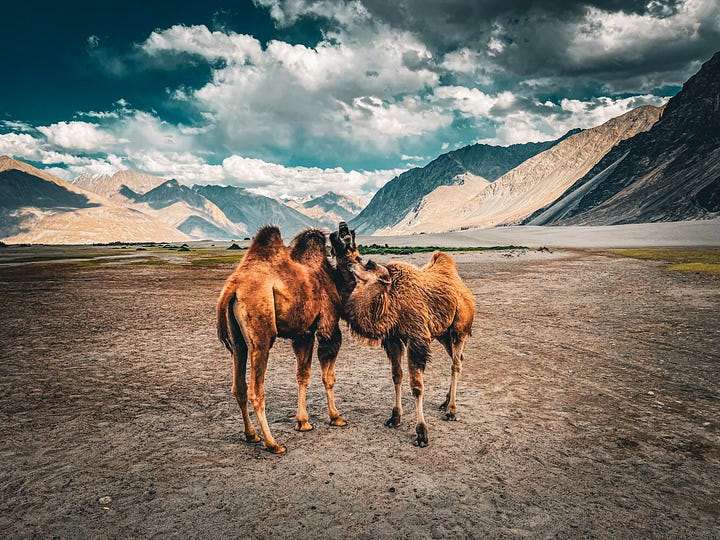
Il caffè del ragazzo all’arrivo è come una manna dal cielo.
E poi la cena: Dahl e riso, chapati e allegria.
“11? Eleven, coffee-milk?”
Ci chiamano col numero della nostra tenda, la mattina dopo che saranno le 5. Silenzio, non fiatiamo. Immobili. Se non rispondiamo forse ci lasceranno dormire.
Vane speranze e concetto di Privacy esageratamente europeo.
“11 mister? Awake?” Il proprietario della voce sta praticamente entrando. Non so se è il ragazzo gentile di ieri, ma in quel momento lo odio. Perché io odio sempre chi mi sveglia, è primordiale.
Poi l’incantesimo.
“Mister, hot water?”
Questa domanda non possiamo ignorarla, è la formula magica del benessere. Perché hot water significa che c’è dell’acqua calda, in un secchio. Tutta per noi.
“Yes!!!!!”
Il mio compagno di tenda si alza e inizia ad armeggiare per raggiungere il detentore del secchio che nel frattempo è quasi dentro. Il mio compagno di tenda – che si dà il caso sia il mio ragazzo – sa che il richiamo dell’acqua calda è sacro e il gelo himalayano delle cinque di mattina è un momento buono come un altro per lavarsi.
L’acqua calda non si rifiuta. Mai.
Dovremo usarla per farci la doccia con la mai compresa tecnica indiana dei diecimila secchielli. Perché la carta igienica non c’è, la corrente elettrica a tratti e un asciugamanino deve bastare per due. Secchielli e brocche però, non mancano mai.
“Julley!”
Ringrazia per l’acqua.
Julley in Ladakh è usato per dire grazie, ma anche ciao e benvenuto. Insomma, con un Julley non ti sbagli. E te lo dicono un sacco, in Ladakh, che è un territorio che rimane isolato per mesi interi l’inverno e di turisti in estate non ne vede tanti. Occidentali e in moto poi, sono una rarità: i nostri Julley noi ce li meritiamo tutti.
Dopo la doccia è ora di ripartire. Ricomponiamo il borsone, lo leghiamo alla moto. Stiamo per andarcene che arriva lui, il ragazzo di ieri. In mano 5 mele verdi, piccoline, colte dall’albero vicino. Ce le offre massaggiandosi la pancia, vuole comunicarci che fanno bene allo stomaco. Almeno spero. Vorrei abbracciarlo.
Saliamo in moto.
“Ciao, ciao. Grazie per le mele. Julley!”
Mi sorride: dondolio di angeli.
Gaia
Dai, aiutami a condividere il post, basta cliccare qui:
Hai letto fino a qui? Clicca sul cuoricino per farmelo sapere.
Oppure, se sei al livello PRO, lasciami un commento:
Ci vediamo mercoledì prossimo con la terza tappa. Arriveremo in Pakistan, o quasi…
[ENG - 4 MINUTES READING TIME]
ROCKING OF ANGELS
Years ago, I read Shantaram.
Actually, I adored Shantaram. And I adored the protagonist: he's exactly the kind of guy I could deeply relate to – the fact that he's an Australian heroin addict on the run, hiding among the underworld of Bombay, it's just a detail. And then, because I like to persevere, I read and loved the sequel as well: The Mountain Shadow. In total, we're talking about 2,202 Indian pages. Did they somehow prepare me for my trip to India? Not at all. Just like the YouTube videos and blog advice didn't prepare me.
They say you never arrive in India ready. It's true. And it's also the reason why I'll go back very soon.
Thanks for reading! Subscribe for free to receive new posts and support my work.
Anyway, today we're in Ladakh which isn't the real India: I'll get there in a few stories. Ladakh is the little Tibet, and we are surrounded by the immense massifs of the Himalayas, Buddhist monasteries, and colorful prayer flags. And then there are lakes, streams, deserts, valleys, canyons: images that crowd inside the helmet. There's only one thing that accumulates in the helmet more than the spectacular landscapes: sand. Pounds of dust in the nose, mouth, eyes, and the bandana I use for protection tries its best, but it's an unequal battle and loses disgracefully.
Shantaram, however, prepared me for meeting the inhabitants of Ladakh: thanks to the book, I discovered the rocking of angels. Had I not read it, I might have missed it, and it would have joined the hundreds of things I didn't really grasp about India.
Rocking of angels is the name I chosed.
In reality, it's a typical head wobble: it tilts to one side, as if to touch one ear to a shoulder, and then the other. A quick, repeated swing — three, four times. If I try to do it, I look like I'm having a deadly spasm. When they do it, however, it has a disarming grace and charm.
Because they do it while smiling and they do it to show respect, to tell you that you're welcomed, that there are no dangers, or that yes, what you're doing is fine. They do it even if you say a word in Hindi and pronounce it so poorly that you've probably insulted them, but they settle for it and swing the head with a conciliatory laugh.
The boy who works at the camp where we’re staying tonight only has to catch my gaze by chance and he starts smiling and rocking. And I want to make him sit with me instead of serving me coffee. I want to tell him to stop apologizing for his broken English: by swinging those eyes, so kind, he communicates everything necessary.
We arrived exhausted at our tent after crossing the powdery Nubra Valley, side by side with the Shyok River. And at the end, a reverse mirage: a desert appeared, with brilliant white dunes and camels crouching. Nestled between peaks of brown mountains.
A battle of wonder and exhaustion.
Hi! Have you read the first episode in Ladakh yet? Here it is: THE TRICOLOR’S ALTITUDE SICKNESS
Here instead you can take a ride to Luxor, on A Taxi Called Helicopter.
The boy’s coffee on arrival is like a godsend.
And then dinner: Dahl and rice, chapati and cheerfulness.
“11? Eleven, coffee-milk?”
They call us by our tent number, the morning after around 5 a.m. Silence, we don't breathe. Motionless. If we don't respond, maybe they'll let us sleep.
Vain hopes and an overly European concept of privacy.
“11 mister? Awake?” The owner of the voice is practically entering. I don't know if it's the kind boy from yesterday, but at that moment I hate him. Because I always hate whoever wakes me, it's primordial.
Then the enchantment.
“Mister, hot water?”
This question cannot be ignored; it's the magic formula of well-being. Because it means there's hot water, in a bucket. All for us.
“Yes!!!!!”
My tent mate gets up and starts fumbling to reach the bucket holder, who is meanwhile almost inside. My tent mate — who happens to be my boyfriend — knows that the call for hot water is sacred, and the Himalayan frost at five in the morning is a good a time as any other to wash ourselves.
Hot water is not to be refused. Never.
We'll then have to use it to shower with the never fully understood Indian technique of ten thousand buckets. Because there's no toilet paper, electricity is intermittent, and one small towel must be enough for two. Buckets and jugs, though, are never lacking.
“Julley!”
He thanks for the water.
Julley in Ladakh is used to say thank you, but also hello and welcome. In short, with a Julley, you can't go wrong. And they say it to you a lot in Ladakh, a territory that remains isolated for entire months in the winter and doesn't see many tourists in the summer. Westerners on motorcycles are even rarer: we deserve all our Julleys.
After the shower, it's time to leave. We repack the duffel bag, tie it to the motorcycle. We’re about to go when he arrives: the boy from yesterday. In his hand, five small green apples, picked from the nearby tree. He offers them to us, massaging his belly, trying to communicate that they're good for the stomach. At least I hope so. I want to hug him.
We get on the motorcycle.
“Bye, bye. Thanks for the apples. Julley!”
He smiles at me: rocking of angels.
Gaia
Come on, help me share the post, just click here:
Have you read this far? Click on the little heart so I know.
Or, if you are at the PRO level, leave a comment:
See you next Wednesday with the third episode. We will arrive in Pakistan, or almost...




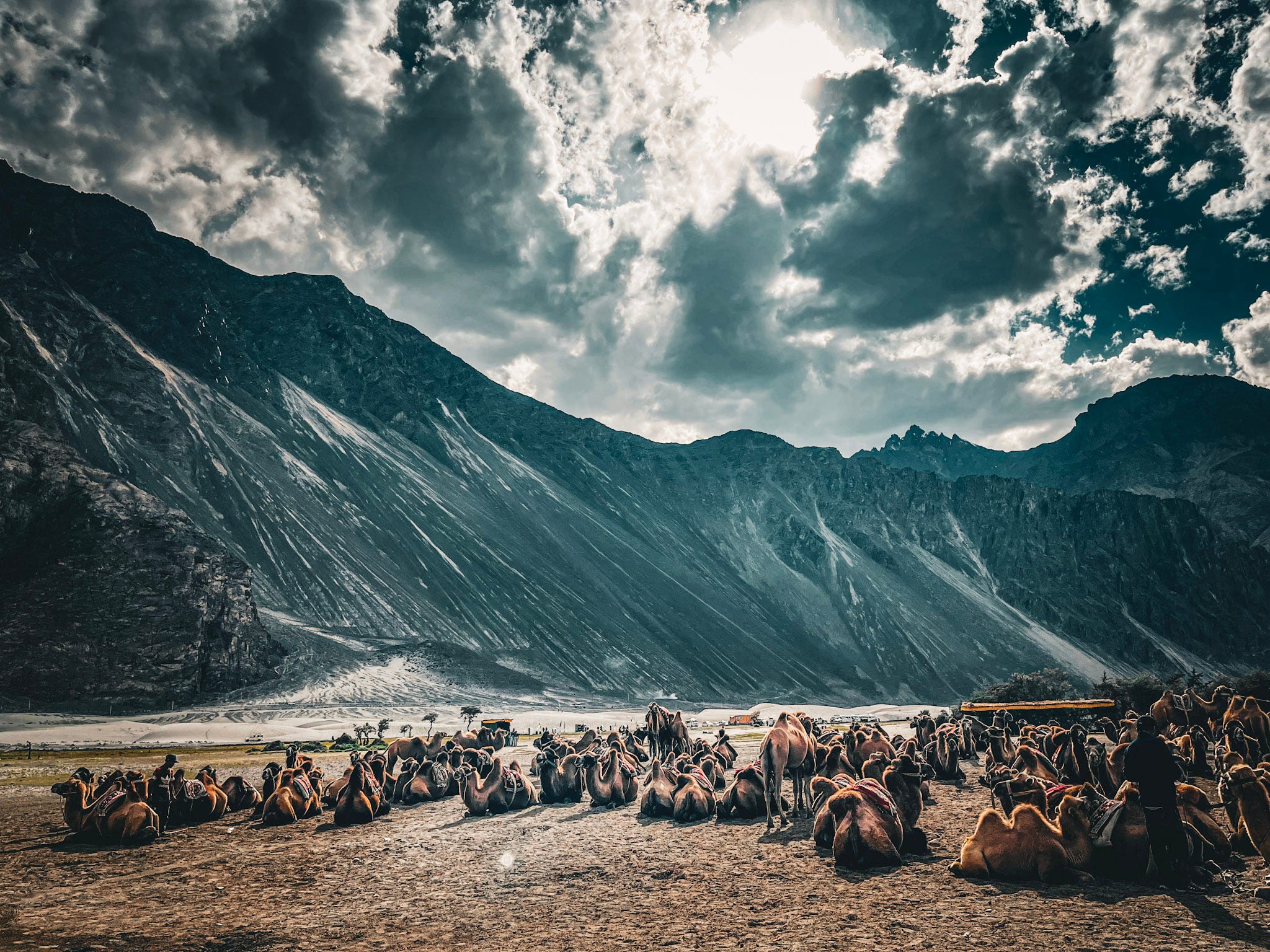
Stupenda, questa mi ha commosso ❤